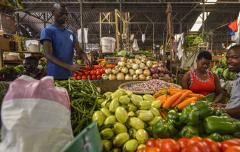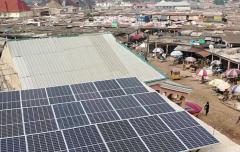Agsol’s solar-powered mills help promote universal energy access
in a series of stories, Sustainable Energy for All (SEforALL) is profiling five entrepreneurs in Africa who recently received the inaugural “Energy Access Booster” awards, which honors those who are implementing energy access projects, including green mini-grids, sustainable mobility, refrigeration and energy for agriculture and drinking water. The awards are in support of Sustainable Development Goal 7 to provide reliable, affordable and clean energy for all by 2030.
Highlights
Every day, women and girls living in off-grid households around the world, spend 250 million hours processing essential staple foods to feed their families, often traveling long distances to milling stations. They are trapped in a poverty cycle, only subsisting on the food they grow and desperately lacking access to modern energy.
Agsol is pioneering the development of technologies to change the lives of the world’s poorest farmers by simultaneously increasing rural productivity and improving energy access.
Nearly a billion people live off-grid and most of them depend on agriculture for their livelihood. Their best chance to generate income is through improved agricultural practices. By linking productive agricultural machines to solar power, Agsol offers a solution for income generation, food processing and access to meaningful and scalable energy.
Agsol designs and manufactures precision-engineered solar-powered mills for off-grid farming communities, using the latest type of DC motors and incorporating the Internet of Things technology and powerful cloud computing. And because they are powered by solar, they can offer access to other energy services to support remote rural communities. This is productivity-led energy access.
Current standard off-grid milling technologies, such as diesel-powered mills, are just not viable in small communities because they are too big and expensive to run. This creates a lot of hardship for farming families in small rural communities, who waste up to one day each week just to process staple foods.
Agsol mills are specifically designed to serve small villages and pay for themselves four times faster than a diesel mill can. Its goal is to develop a more distributed and accessible network of solar mills in rural areas that provide convenient access to essential milling and energy services. In doing so, it allows women in off-grid communities to use their time more productively and achieve economic and social benefits.
Agsol was established in 2016 by Matt Carr, its chief executive, and Greg Denn, its chief technology officer. Combined, they have spent more than 40 years working in the agricultural and renewable energy sectors.
Carr previously worked on energy access projects in Papua New Guinea (PNG), Southeast Asia and West Africa. Denn, a mechanical engineer, manufactured and supplied agricultural machines throughout the Pacific for nearly two decades.
“Agsol was Greg’s idea,” said Carr. “He had been working with small scaled agro-processing machinery and solar technologies for nearly two decades and began playing around with the idea of connecting the two.”
But raising enough initial capital proved difficult. “We invested every dollar of personal money we had at our disposal, borrowed as much as we could from family and friend, and pushed hard on making commercial sales. We had a strong network and customer base in Papua New Guinea that we could leverage for early commercial sales,” said Carr.
An order from the largest rice company in the PNG “gave us the capital and confidence to move ahead quickly and start building our manufacturing capabilities in China.”
Since then, Agsol has developed eight different types of agro-processing machines, including rice mills, cassava graters and flour mills, and has put more than 600 machines into the field, mainly in the PNG and Indonesia.
Agsol is focusing on its second stage of growth by expanding to East Africa and developing a new generation of machines that is now being tested.
The Energy Access Booster grant “has enabled us to fund the hire of key new talents and support the roll-out of the first 10 prototypes of our new second generation machines with field partners in Kenya, Uganda and Tanzania,” said Carr. “Off the back of these pilots, Agsol wil manufacture and deploy 100 machines by the third quarter of this year and seek its first capital raising round in the fourth quarter. None of this would be possible without the support of EAB.”
Agsol partners with local solar companies, agricultural machinery suppliers and project developers to deploy machines in off-grid markets.
Agsol’s power platform is an adaptable power unit that can run multiple devices and systems, including power milling machines, clean water supply, small businesses or a nano grid. It also has outputs for lights, phone chargers and small appliances. The power platform allows room for growth with the use a simple plug-and-play system to add solar panels, batteries, and other machines and devices.
One big advantage for farmers using machines powered by solar power is that they generate income from the outset and provide a rapid return on investment. By embedding IoT hardware, customers can purchase them under a digital finance pay-as-you-go model in less than two years.
Agsol machines grow rural economies. They generate income, keep money in the community, boost labor efficiency and provide a solar power platform for other commercial activities.
Inclusivity is a major goal. Agsol machines deliver social change in villages by easing the burden of manual labour and saving time for women and girls. They are a tool to end energy poverty, delivering social benefits across education, health, employment and other areas.
Related content

SDG7 News
16 Nov 2021

SDG7 News
30 Aug 2021

SDG7 News
11 Aug 2021

SDG7 News
22 Jul 2021
